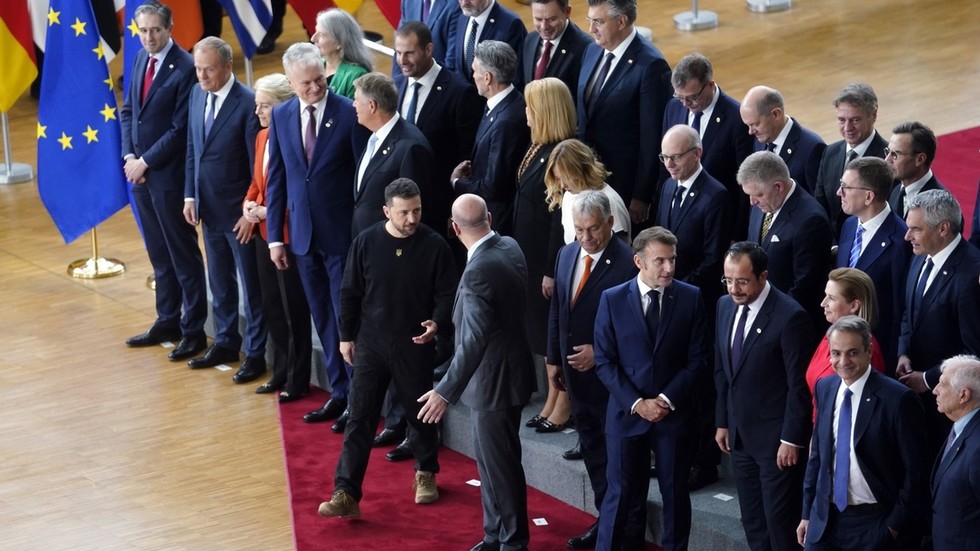The European Union (EU) has subtly shifted its rhetoric regarding the ongoing conflict in Ukraine, moving away from the assertive stance of “Ukraine must win this war” to a more defensive statement emphasizing that “Russia must not prevail.” This change was highlighted in a recent European Council statement on new sanctions against Russia, which was first released on Monday. According to an EU official, the original phrasing was a mistake that did not align with the growing diplomatic efforts of the EU. This revision appears to reflect an understanding within Brussels of the geopolitical implications of their statements, particularly in relation to the incoming U.S. administration under President-elect Donald Trump, who is anticipated to advocate for a rapid resolution to the conflict.
Despite this change in messaging from the European Council, many senior EU figures, such as the bloc’s chief diplomat Kaja Kallas, continue to maintain that “Ukraine will win” in their public communications. This duality demonstrates the complexity and tension within the EU regarding its position on the Ukraine conflict. The Politico report suggests that EU leaders are becoming increasingly aware of their reliance on the United States’ support to sustain their efforts in Ukraine. With shifting dynamics in Washington, there appears to be a sense of concern among EU leaders about how to navigate the relationship and ensure that their stance on Ukraine remains robust, even while adjusting their language to fit the evolving diplomatic landscape.
The perceived shift in EU policy could indicate a broader reconsideration of Western strategies in relation to the conflict, particularly in light of Trump’s possible diplomatic maneuvers. His presidency may usher in a new approach, one that could prioritize a swift end to hostilities over continued military support for Ukraine. Politico highlights that the EU’s strategy seems to be an attempt to flatter Trump — projecting a favorable alignment while conveniently overlooking some of his more controversial statements regarding international relations. This precarious balancing act could create a scenario where Brussels is left vulnerable, having to adjust its rhetoric based on the political currents from Washington.
As the EU recalibrates its message, Ukraine’s government has not shown any inclination to soften its position against Russia. President Volodymyr Zelensky and his chief of staff Andrey Yermak have publicly criticized Russian President Vladimir Putin, dismissing his recent comments during an annual press event. This ongoing assertiveness from Kiev signifies that Ukrainian leaders still believe in their cause and are unwilling to acquiesce to external pressures or peace efforts that do not align with their interests. The contrasting responses between the EU and Ukraine underscore the complex interplay of international diplomacy, national pride, and the realities of war, highlighting how different parties perceive their roles in the conflict.
Former Russian President Dmitry Medvedev’s comments further complicate the situation, suggesting that Ukrainian leaders are intentionally aggravating tensions with Russia to hinder any potential peace negotiations that Trump might pursue. His assertion that Zelensky is provocatively challenging the incoming American president illustrates how the conflict in Ukraine is not only a regional issue but also a battleground for broader geopolitical power dynamics. Medvedev’s remarks suggest an acute awareness of the potential impact of external leadership changes on the conflict, reflecting a strategic calculation on the part of Russia regarding Ukraine’s assertiveness.
In summary, the EU’s transition from a winning narrative for Ukraine to a more cautious stance indicates a nuanced understanding of the shifting geopolitical context. While EU leaders aim to assert their commitment to preventing Russian aggression, their reliance on U.S. support complicates their ability to project a united front. Concurrently, Ukraine remains steadfast in its narrative of resistance, rejecting any appearance of weakness. As the dynamics between these actors evolve, the future of the conflict could be heavily influenced by both internal calculations and external pressures, suggesting a complex interplay that will need to be monitored closely as different administrations come into play. The evolving rhetoric, actions, and responses from each side reflect the ongoing struggle to maintain sovereignty, influence, and strategic advantage in a fraught geopolitical landscape.

